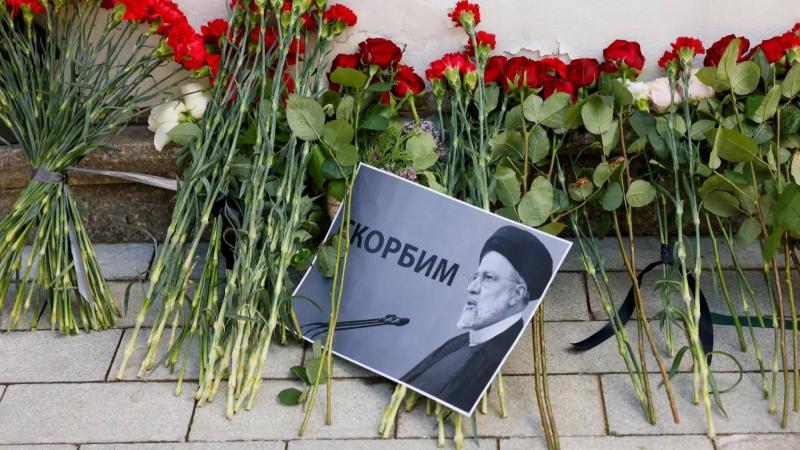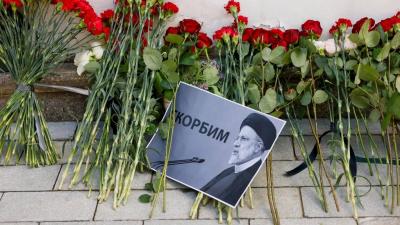Iranian investigations are expected to blame the weather as the rhetoric against the United States continues, attributing the incident to the U.S. sanctions on Iran, as noted in a tweet from former Foreign Minister Mohammad Javad Zarif.
The topic in the region revolves around the cause of the crash of Iranian President Ebrahim Raisi's helicopter last week. Speculations abound, with conspiracy theories and rumors suggesting that the crash was not an accident but a planned assassination. However, what conclusions will the Iranian investigations reach, which will take some time to address the situation, absorb the shock, and carefully consider all possibilities? The investigations are likely to conclude with two possibilities: 1. An accidental incident due to a technical malfunction, pilot error, inclement weather, or all these reasons combined. 2. A premeditated assassination attempt against the Iranian President and his Foreign Minister, Hossein Amir-Abdollahian. This second possibility raises three parties that could be behind the assassination.
The first potential party could be an internal faction within the struggle for succession to Supreme Leader Ali Khamenei. Rumors have circulated that Mojtaba Khamenei, the Supreme Leader's son, aims to succeed his father and believes, like many others, that Raisi is a potential successor. Some observers of Iranian affairs suggest that this faction may have sought to prevent that succession. However, this hypothesis could lead to significant internal repercussions, potentially resulting in open internal conflict that threatens the regime, something the Supreme Leader would not accept. Thus, it is unlikely that the investigation will point fingers at internal parties.
Questions and observations about the incident surrounding Raisi's death arise. The second potential party that might be responsible for the assassination is the Israeli Mossad, which is a plausible hypothesis considering that the Mossad has previously assassinated nuclear scientists and Iranian officials within Iran or affiliated with Iran in Lebanon, Syria, and Iraq. The incident occurred shortly after the Iranian President and Foreign Minister returned from the inauguration of a dam between Iran and its neighbor Azerbaijan, which is known for its strong military and security ties with Israel, which has a military base not far from the Iranian border. However, Iran would not want to implicate Azerbaijan due to its strong national ties with Turkey, which was crucial in Azerbaijan's recent unexpected victory over Armenia three years ago. Blaming Azerbaijan could bring blame upon Turkey, which Iran does not desire at this stage. Additionally, the assassination could be purely Israeli without assistance from Azerbaijan, as Israel has not yet been satisfied with its retaliation against Iran after it launched ballistic missiles and drones against it last month. The limited Israeli response was due to U.S. pressure, which has been monitoring and coordinating attacks between the two sides to prevent escalation into a full-scale war in the region as the U.S. presidential elections approach.
It would be difficult for the Iranians to officially point to Israel as being behind the assassination plot, as doing so would necessitate a violent and wide-ranging response, which is not in Iran's calculations and would not be accepted by the United States. If Iran accused Israel of being behind the incident, it would require a war and broader attacks than those that followed the Israeli attack on the Iranian consulate in Damascus earlier last month, in which seven Iranian military officials were killed. This prompted Iran to respond militarily—even though it was limited—by directly bombing Israel for the first time in the history of the two countries. If Iran were to accuse Israel of assassinating its president on its soil, this would likely mean an open war with Israel, which is something Benjamin Netanyahu and the far-right Zionist factions desire to alleviate international pressure on them due to the Gaza war and to entangle the United States and the West in a war with Iran. However, that would result in exhausting Iran, which is already facing economic and internal problems. Therefore, it is unlikely that the investigations will come to such conclusions.
It is most probable that the Iranian investigations will blame the weather while continuing the campaign rhetoric against the U.S., attributing the sanctions as causing the incident, as noted in the tweet from former Foreign Minister Mohammad Javad Zarif.




